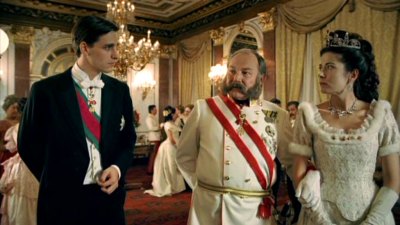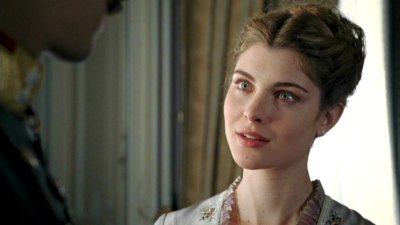| Reviews & Columns |
|
Reviews DVD TV on DVD Blu-ray 4K UHD International DVDs In Theaters Reviews by Studio Video Games Features Collector Series DVDs Easter Egg Database Interviews DVD Talk Radio Feature Articles Columns Anime Talk DVD Savant Horror DVDs The M.O.D. Squad Art House HD Talk Silent DVD
|
DVD Talk Forum |
|
|
| Resources |
|
DVD Price Search Customer Service #'s RCE Info Links |
|
Columns
|
|
|
Crown Prince (Kronprinz Rudolf), The

The Crown Prince goes into quite a bit of detail concerning the myriad treaties and connecting ties between the Austro-Hungarian Empire and Germany and France, and I'm not going to try and recount that here (I had enough of that in high school, thank you). But The Crown Prince is quite lucid, actually, in navigating through this seemingly endless ribbon of connections, presenting the story of a potential ruler who craved change for his empire, crushed by the expedient, often cruel realities of politics and the military.
Rudolf, played by Max von Thun, is portrayed in The Crown Prince as a crusading, liberalizing, modernizing force for change in the Empire, a ruler who, once put on the throne, would enact policies that respected the various cultures and peoples of the vast A-H Empire, and who would retreat from military treaties with aggressive Germany, in favor of ties with France. Of course, this is anathema to his father, Emperor Franz-Joseph (Klaus Maria-Brandauer), who views his son's liberal tendencies as dangerous to the survival of the Empire as he knows it.
The Emperor, not amused with his son's playboy lifestyle, is further aggravated by Rudolf's seeming willingness to align himself with policies and even foreign governments who the Emperor sees as threats to the established order of the empire. Rudolf's dream, which The Crown Prince's script says was ahead of its time, was to see a united Europe respectful of the numerous cultures within its borders. But Rudolf's refusal to heed his father's restrictions causes great psychological disturbances within the prince (further exacerbated by his father's rather cruel and dismissive treatment of Rudolf) that eventually leads to his tragic end.
Rudolf's romantic complications are also detailed here, including his torrid affair with Helene Vetsera (Alexandra Vandernoot), an older Baroness whose young daughter Mary (Vittoria Puccini) will eventually become Rudolf's lover, as well. His sham marriage to Princess Stephanie of Belgium is also examined (just as an indication of the level of commitment in their marriage: Rudolf eventually gives her a venereal disease), as well as his erotic, pressure-relieving affair with prostitute Mizzi Kaspar (Birgit Minichmayr).
If I remember my high school history class correctly, there was conspiracy talk about the suicide of Rudolf and Mary, but that's nowhere to be seen here in The Crown Prince. The film is very clear about blaming not only the corrosive, poisonous relationship between Rudolf and his controlling, domineering, cold father, but also Rudolf's realization that his love affair with Mary, deemed unsuitable by his father, would never be allowed to continue. Whether or not you buy this theory depends, I would imagine, on what your level of historical expertise is concerning this event. I don't know the first thing about this period, other than what I slept through in school, so I'll take the film at its word. What I can comment on is how the theory is presented in dramatic fashion, and if it makes for good television.
The Crown Prince is sumptuously filmed on location, with crystalline-clear cinematography and gorgeous set design, logically, methodically set out by director Robert Dornhelm. What isn't too clear, or perhaps more accurately not convincing, is the actual psychology of Rudolf. Throughout the miniseries, Rudolf is shown buffeted by the political winds of the A-H Empire, and by the impending responsibilities of his upcoming succession. As well, he's shown tormented by his father's repeated rejection, and callous disregard for him. However, we're never really made to feel that Rudolf's only solution is to commit suicide. Indeed, that reckless act comes almost out of the blue. Sure, the director provides a couple of scenes foreshadowing Rudolf's despondency, but in-between jumping into bed with his various lovers, and sparring with his father, one never gets the feeling we truly know Rudolf.
His belief that Europe could be united peacefully is frequently thrown out as his main redeeming feature, but it's hard to reconcile that with the film's insistence on presenting Rudolf as a romantic cipher whose loyalties are never spelled out. Does he love Mizzi? Does he love Mary? He seems to swear to each of them that they're indispensable, but he's sleeping with both of them at the same time. As well, he's sleeping with his wife, giving her VD, which he presumably received from some other unseen woman, because Mary and Mizzi are never shown to be infected. With all this emotional activity, one would think the filmmakers would have plenty of opportunities to show Rudolf as a three-dimensional, layered character. But by the end of the three hours of The Crown Prince, I didn't really know whom he truly loved, why he loved them, or why he killed Mary (which is really out in left field, in terms of the film's internal logic) or indeed himself. And if I don't know those answers, what's the point of The Crown Prince beyond looking pretty and offering a conventional romantic story?

The DVD:
The Video:
The anamorphically enhanced, 1.78:1 widescreen video transfer for The Crown Prince is quite beautiful, although I did notice some jiggering during pans that might indicate PAL transfer issues. Still, it's a cleanly delineated picture, with subtly rendered color values.
The Audio:
The Dolby Digital English 2.0 stereo soundtrack is as crisp and clean as the video image. There are no subtitles or close-captions available.
The Extras:
There are no extras for The Crown Prince.
Final Thoughts:
The Crown Prince offers a pretty façade, with good acting and a seeming wealth of detail concerning the romantic and political exploits of the famously tragic life of Crown Prince Rudolf of Austria. However, after three hours I didn't feel I really understood why Rudolf supposedly killed himself and Baroness Mary Vetsera - and that would seem to be the main point of the drama. Rent it for the scenery, the sets, and the generally good thesping, though.
Paul Mavis is an internationally published film and television historian, a member of the Online Film Critics Society, and the author of The Espionage Filmography.


|
| Popular Reviews |
| Sponsored Links |
|
|
| Sponsored Links |
|
|
| Release List | Reviews | Shop | Newsletter | Forum | DVD Giveaways | Blu-Ray | Advertise |
|
Copyright 2024 DVDTalk.com All Rights Reserved. Legal Info, Privacy Policy, Terms of Use,
Manage Preferences,
Your Privacy Choices | |||||||














